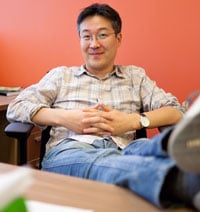 A research team at the UC San Diego’s Moores Cancer Center recently received a major new grant from the California Institute for Regenerative Medicine (CIRM) for a groundbreaking cancer study. The research will be led by Thomas J. Kipps, MD, PhD, deputy director of research operations at the Moores Cancer Center and a professor of medicine at UC San Diego (Image courtesy of UCSD).
A research team at the UC San Diego’s Moores Cancer Center recently received a major new grant from the California Institute for Regenerative Medicine (CIRM) for a groundbreaking cancer study. The research will be led by Thomas J. Kipps, MD, PhD, deputy director of research operations at the Moores Cancer Center and a professor of medicine at UC San Diego (Image courtesy of UCSD).
Tags: 2014, University of California San Diego, Stem cell research, Southwest, California, San Diego, SDVS, UC San Diego, Biotechnology Vendor Showcase, Southwest Region, CIRM
Tags: 2014, CA, University of California San Diego, 2013, Stem cell research, Southwest, California, San Diego, SDVS, Biotechnology Vendor Showcase, new funding
Lab suppliers interested in meeting researchers with life science funding available to stock their labs in San Diego will want to take note of the latest life science funding news at the University of California, San Diego. Researchers at the University of California, San Diego received a $6 million grant from the NIH this year. The money will go towards the San Diego Clinical and Translational Research Institute and will fund the internal medicine department and the school of medicine.
Tags: 2014, CA, 2013, Southwest, San Diego, SDVS, UC San Diego, Biotechnology Vendor Showcase, NIH funding, NIH grant, NIH award
Are you a lab supplier who is looking to increase your presence or expand your influence at the top California Universities? Take advantage of these upcoming life science trade shows that will provide you with an effective way to network with leading California researchers:
Tags: 2014, CA, 2013, University of Southern California, Southwest, USC, Los Angeles, LAVS, San Diego, SDVS, BioResearch Product Faire Event, UC San Diego, Biotechnology Vendor Showcase, Riverside, UC Riverside, Irvine, UCI, UC Irvine, UCR, UC Los Angeles
Funded in part by grants from the California Institute for Regenerative Medicine and the NIH, researchers at the University of California, San Diego have come up with a simple, easily repeated RNA-based technique of generating human induced pluripotent stem cells (iPSCs). The study was published in the August 1st edition of Cell Stem Cell. The researchers’ method has wide-ranging applications for others searching for new cell therapies and use in other stem cell studies.
Tags: 2014, CA, University of California San Diego, 2013, Stem Cells, Stem cell research, Southwest, California, San Diego, SDVS, UCSD, Biotechnology Vendor Showcase
 In what is being hailed as a victory for both scientific research and patients' rights, the Supreme Court ruled unanimously yesterday that human genetic material cannot be patented. The case, Association for Molecular Pathology v. Myriad Genetics, has been working its way through the court system for a number of years now, led by plaintiffs including the ACLU, the American College of Medical Genetics, the American Society for Clinical Pathology, and numerous prominent genetic research scientists. The verdict invalidates the patents Myriad Genetics has held on breast cancer genes BRCA1 and BRCA2 since the 1990's and allows other labs besides theirs to test for mutations in those genes which, when present, strongly indicate a genetic predisposition to cancer. It also means that scientists can move forward in their genetic research without threat of being sued for copyright infringement. While the case was brought against Myriad specifically, the decision to disallow human gene patenting has profound implications for both scientific discovery and individual rights of ownership over our own genetic material.
In what is being hailed as a victory for both scientific research and patients' rights, the Supreme Court ruled unanimously yesterday that human genetic material cannot be patented. The case, Association for Molecular Pathology v. Myriad Genetics, has been working its way through the court system for a number of years now, led by plaintiffs including the ACLU, the American College of Medical Genetics, the American Society for Clinical Pathology, and numerous prominent genetic research scientists. The verdict invalidates the patents Myriad Genetics has held on breast cancer genes BRCA1 and BRCA2 since the 1990's and allows other labs besides theirs to test for mutations in those genes which, when present, strongly indicate a genetic predisposition to cancer. It also means that scientists can move forward in their genetic research without threat of being sued for copyright infringement. While the case was brought against Myriad specifically, the decision to disallow human gene patenting has profound implications for both scientific discovery and individual rights of ownership over our own genetic material.
Tags: 2014, CA, 2013, Bioresearch, gene patenting, cancer research, Southwest, Southwest life science marketing events, Cancer Treatment, San Diego, SDVS, Genetics, UC San Diego, biotech industry, Biotechnology Vendor Showcase
One of the reasons cancer is so successful and difficult to treat is that it uses the body's own systems to proliferate, thrive, and hide from attack. Bioresearch scientists out to target cancer are taking a similar approach, building tiny bio-vehicles for locating tumors that reach their destination without setting off a massive immune system alarm or flooding the whole body with toxic chemicals. A team of biochemists at the University of California San Diego led by Dr. Nathan Gianneschi has developed a nanoparticle that assumes a benign shape to travel covertly through the blood system, then, recognizing a tumor, reassembles via an enzymatic cue into a net to attach itself to the cancerous target.
Tags: 2014, CA, University of California San Diego, 2013, Nanobiotechnology, cancer research, Southwest, California, University of California, San Diego, SDVS, BioResearch Product Faire Event, UCSD, Biotechnology Vendor Showcase
Bioengineers at the University of California San Diego have come up with a novel way of removing dangerous toxins from the bloodstream using biomimetic nanosponges. These tiny clean-up particles work by posing as red blood cells, which serves both to evade the body's immune system response to foreign invaders and to attract the toxins to themselves instead of to actual red blood cells. When the toxins have all attached themselves to the nanosponges, they are processed out through the liver without harming the body. The research into this promising therapy comes out of the Zhang Lab in the Jacobs School of Engineering, where in 2011 they pioneered the red blood cell disguise technology for cloaking cancer drug cocktails, allowing the drugs much more time in the body to target diseased cells. Dr. Liangfang Zhang is also on the research faculty of the UCSD Moores Cancer Center.
Tags: 2014, CA, University of California San Diego, 2013, nanoparticle, Nanobiotechnology, nanotechnology, Nanoscience, Southwest, California, University of California, Cell Research, San Diego, SDVS, UCSD, Biotechnology Vendor Showcase
The California Institute for Regenerative Medicine (CIRM) is a major funding agency for stem cell research in the Golden State. Since voters approved the establishment of the agency in 2004, the CIRM has spent billions on research and facilities with the aim of making California the stem cell capital of the US. Now, in a move to advance that research mission even further, the agency has announced awards of $32M to investigators and stem cell companies to create a biobank of diseased cell lines for the use of researchers around the world. Called the Human Induced Pluripotent Stem Cell (hiPSC) Initiative Awards, the project will generate and ensure the availability of high quality disease-specific hiPSC resources for disease modeling, target discovery and drug discovery and development for prevalent, genetically complex diseases.
Tags: 2014, CA, 2013, Stem cell research, Southwest, California, Los Angeles, Biobank, biobanking, LAVS, San Diego, SDVS, San Francisco, SFVS, UC San Diego, Biotechnology Vendor Showcase, UC San Francisco, CIRM, Parnassus Campus, tradeshow, Mission Bay Campus, Parnassus, Mission Bay, BVS, UC Los Angeles
 The tighter funding gets, the more likely it is that young investigators pursuing big ideas will get passed over and science grant money will stay with safer, more established projects. Fortunately there are exceptions to that general rule, including a new program established by the Paul G. Allen Family Foundation specifically to support select pioneering research projects that aim to unlock fundamental questions in biology. They recently awarded investigators from 5 prestigious US universities a total of $7.5M to pursue basic questions about the origins and mechanisms of cellular behavior. One of those 5 Distinguished Investigator awards, for $1.6M, is going to quantitative biologist and recent hire Suckjoon Jun, who works in physics and molecular biology at the University of California San Diego. His project title is "Cell-size control and its evolution at the single-cell level," and includes developing methods to perform long-term directed single-cell evolution experiments, as well as single-cell on-chip manipulation, sequencing, and mathematical modeling.
The tighter funding gets, the more likely it is that young investigators pursuing big ideas will get passed over and science grant money will stay with safer, more established projects. Fortunately there are exceptions to that general rule, including a new program established by the Paul G. Allen Family Foundation specifically to support select pioneering research projects that aim to unlock fundamental questions in biology. They recently awarded investigators from 5 prestigious US universities a total of $7.5M to pursue basic questions about the origins and mechanisms of cellular behavior. One of those 5 Distinguished Investigator awards, for $1.6M, is going to quantitative biologist and recent hire Suckjoon Jun, who works in physics and molecular biology at the University of California San Diego. His project title is "Cell-size control and its evolution at the single-cell level," and includes developing methods to perform long-term directed single-cell evolution experiments, as well as single-cell on-chip manipulation, sequencing, and mathematical modeling.
Tags: 2014, CA, University of California San Diego, 2013, cell biology, Southwest, California, University of California, Cell Research, San Diego, SDVS, Funding, UCSD, Biotechnology Vendor Showcase


